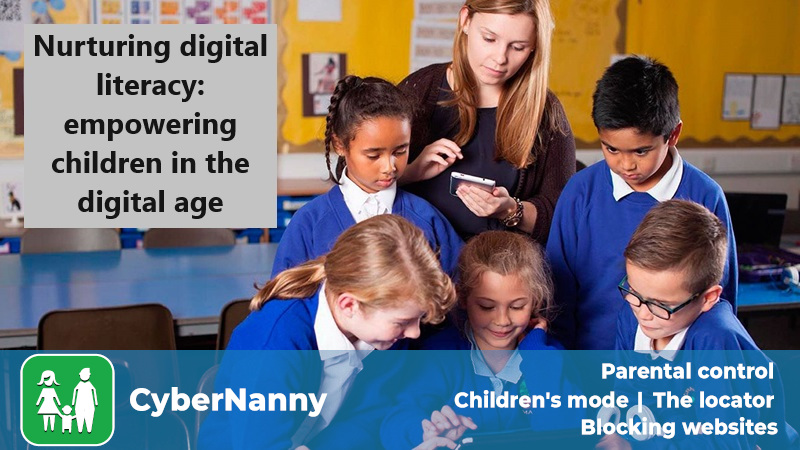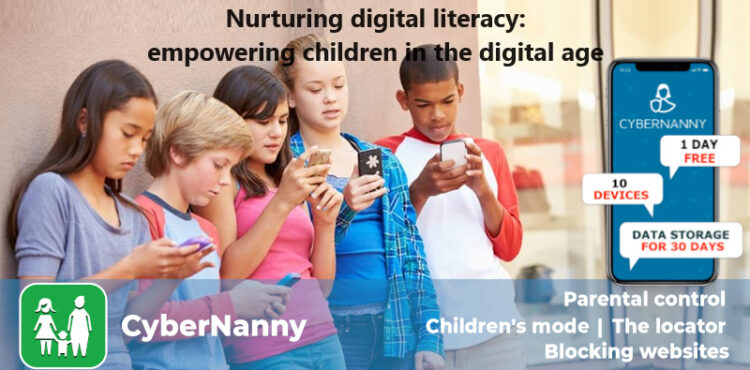Nurturing digital literacy refers to the process of equipping individuals, especially children, with the skills, knowledge, and attitudes required to navigate and thrive in the digital world. It encompasses a broad range of competencies, including the ability to use digital devices, critically evaluate online information, understand digital etiquette, and safeguard personal information. In the context of children and the internet, nurturing digital literacy is about empowering them to use technology responsibly, safely, and effectively.
Here’s how nurturing digital literacy is connected to children and their online experiences:
- Understanding Technology
Digital literacy involves familiarizing children with various digital tools and technologies. It helps them become comfortable using devices, applications, and online platforms, setting the foundation for a positive digital experience.
- Critical Thinking Skills
Digital literacy encourages the development of critical thinking skills. Children learn to evaluate the reliability of online information, distinguish between credible and unreliable sources, and make informed decisions in the digital space.
- Online Safety
Nurturing digital literacy is closely tied to online safety. Children gain an understanding of the potential risks associated with internet use, such as cyberbullying, scams, and inappropriate content. They learn how to protect themselves and make responsible choices online.
- Digital Communication Etiquette
Digital literacy includes teaching children proper etiquette for online communication. This involves understanding the impact of words, images, and actions in a digital context, promoting respectful interactions, and discouraging cyberbullying.
- Privacy Awareness
Children learn about the importance of privacy in the digital realm. Digital literacy education emphasizes the significance of safeguarding personal information, recognizing online threats, and using privacy settings effectively.
- Media Literacy
Digital literacy extends to media literacy, helping children deconstruct and analyze media messages. They develop the ability to understand the persuasive techniques used in digital content and become discerning consumers of online information.
- Responsible Digital Citizenship
Nurturing digital literacy instills the principles of responsible digital citizenship. Children learn about their rights and responsibilities in the online community, promoting positive and constructive participation in digital spaces.
- Adaptability and Creativity
Digital literacy fosters adaptability and creativity by encouraging children to explore digital tools for learning and self-expression. This includes activities such as content creation, coding, and engaging with educational platforms.
- Parental Guidance
While children can develop digital literacy skills independently, parental guidance plays a crucial role. Parents can actively participate in their child’s digital education, discussing online experiences, setting boundaries, and reinforcing positive digital behavior.
- Lifelong Learning
Nurturing digital literacy is an ongoing process that prepares children for a future where technology will continue to evolve. It instills a mindset of lifelong learning, adaptability, and responsible engagement with digital resources.
In essence, nurturing digital literacy empowers children to be confident, responsible, and informed participants in the digital world. It equips them with the tools to navigate the complexities of the internet while fostering a positive and safe online experience.
How to set parental control on a child’s mobile phone

Installation Process:
Step 1. Download CyberNanny from Google Play and install it on your Android phone.
Step 2. Install it on your child’s Android phone.
Step 3. Maintain control of social media activities on your child’s phone.
Important Notes:
- The first 24 hours are free.
- One cabinet can connect up to 10 devices.
- Data is stored in the cabinet for 30 days from the moment of receipt.
Cautionary Information:
Parents should inform their child before installing parental controls, making them aware that their correspondence and location may be monitored.
It is imperative to exercise caution and only download CyberNanny parental control from Google Play to avoid falling victim to scammers or counterfeit applications. The protection of children online necessitates a balance between ensuring safety and fostering trust through open communication about monitoring practices.
For any inquiries, please feel free to reach out to our consultants.

